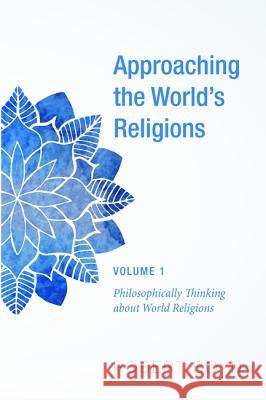Approaching the World's Religions, Volume 1 » książka
Approaching the World's Religions, Volume 1
ISBN-13: 9781498295925 / Angielski / Miękka / 2017 / 336 str.
Approaching the World's Religions, Volume 1
ISBN-13: 9781498295925 / Angielski / Miękka / 2017 / 336 str.
(netto: 148,01 VAT: 5%)
Najniższa cena z 30 dni: 153,69
ok. 16-18 dni roboczych.
Darmowa dostawa!
Philosophically Thinking about World Religions is different from other works in the discipline today. It deviates from the typical approaches used for the study of world religions. Its goal is to engage readers in thinking hard about world religions, not about the data surrounding those traditions. By focusing on philosophical questions, each reader should be challenged to do their own investigations that may reveal the heart of these traditions. Another stance that this project takes that distinguishes it from other texts in the discipline is that it advocates an inclusivist perspective regarding the world religions. Pluralism, which is the predominate assumption today, ends either in contradiction or in the development of a metatheory that dismisses crucial distinctions between the various traditions or eliminates some ancient religions because they do not fit the metatheory. By taking an open inclusivist approach, all religious traditions may engage at the table of dialogue. The final essay is about justice and social affairs. While that discussion is couched within the context of a particular tradition, each religious tradition must have the discussion. But it must be more than an intrareligious dialogue; it must become an interreligious dialogue. ""Boyd provides the student of religion a creatively organized and helpful overview of foundational issues in the philosophy of religion in general, and of specific religious traditions in particular. This will be an invaluable text for college and other courses introducing the beliefs of the major religions of the world and relating them to key philosophical topics."" --Darren Duerksen, Fresno Pacific University Robert Boyd has taught philosophy at Fresno City College since 1996. He took his PhD from the University of Wales at Lampeter. In addition to publishing several books in the field of critical reasoning, he has authored or coauthored a number of articles in peer-reviewed journals. While he has maintained his interest in logic and critical reasoning, much of his current research deals with the study of world religions and the theology of religions.
Philosophically Thinking about World Religions is different from other works in the discipline today. It deviates from the typical approaches used for the study of world religions. Its goal is to engage readers in thinking hard about world religions, not about the data surrounding those traditions. By focusing on philosophical questions, each reader should be challenged to do their own investigations that may reveal the heart of these traditions. Another stance that this project takes that distinguishes it from other texts in the discipline is that it advocates an inclusivist perspective regarding the world religions. Pluralism, which is the predominate assumption today, ends either in contradiction or in the development of a metatheory that dismisses crucial distinctions between the various traditions or eliminates some ancient religions because they do not fit the metatheory. By taking an open inclusivist approach, all religious traditions may engage at the table of dialogue. The final essay is about justice and social affairs. While that discussion is couched within the context of a particular tradition, each religious tradition must have the discussion. But it must be more than an intrareligious dialogue; it must become an interreligious dialogue.""Boyd provides the student of religion a creatively organized and helpful overview of foundational issues in the philosophy of religion in general, and of specific religious traditions in particular. This will be an invaluable text for college and other courses introducing the beliefs of the major religions of the world and relating them to key philosophical topics.""--Darren Duerksen, Fresno Pacific UniversityRobert Boyd has taught philosophy at Fresno City College since 1996. He took his PhD from the University of Wales at Lampeter. In addition to publishing several books in the field of critical reasoning, he has authored or coauthored a number of articles in peer-reviewed journals. While he has maintained his interest in logic and critical reasoning, much of his current research deals with the study of world religions and the theology of religions.











